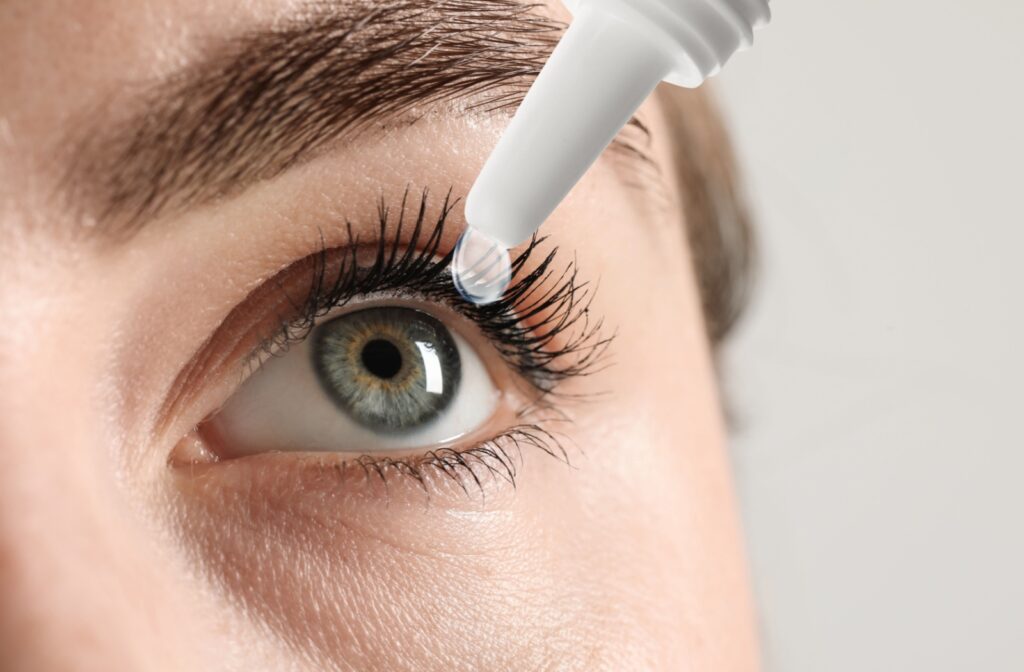Dry eye syndrome is a prevalent and often persistent condition affecting countless individuals worldwide. Although it may initially appear as a minor nuisance, dry eyes can significantly impact your comfort and visual clarity.
Blurry vision is a common complaint among those with this condition. But how does dry eye lead to blurry vision? Insufficient tear production or rapid tear evaporation can destabilize the tear film, causing inflammation and surface damage to the eye, which often results in blurred vision.
At Bluebird Vision + Wellness, we excel in providing personalized eye care solutions. Our professional team is dedicated to delivering top-notch services, ranging from routine eye examinations to specialized treatments for conditions like dry eye syndrome. We are committed to guiding you toward optimal eye health and crystal-clear vision.
Exploring Dry Eye Syndrome
Dry eye syndrome arises when the eyes generate insufficient tears or when tears dissipate rapidly. Tears consist of a complex blend of water, oils, and mucus, each essential for sustaining ocular health. Disruption in the balance of these elements can lead to instability in the tear film and inadequate lubrication. This insufficiency leaves parts of the eye’s surface exposed, rendering them susceptible to irritants and infections.
This exposure often results in inflammation on the eye’s surface, causing discomforts like redness, itching, and a sensation akin to having grit in the eyes. Over time, persistent inflammation can harm the sensitive tissues of the cornea and conjunctiva, exacerbating discomfort and contributing to vision issues.
Beyond merely providing moisture, tears serve as a protective shield against environmental contaminants such as dust and smoke, deliver vital nutrients to eye tissues, and facilitate the healing of minor surface injuries. Without a stable tear film, the eye’s performance is impaired, leading to reduced clarity of vision and compromised overall eye health.
Factors Leading to Dry Eye
Several elements may contribute to the development of dry eye syndrome, such as:
- Aging: Tear production often diminishes as people grow older.
- Health Conditions: Diseases like diabetes, rheumatoid arthritis, and thyroid imbalances can lead to dry eyes.
- Medications: Some drugs, including antihistamines, decongestants, and antidepressants, can lower tear production.
- Environmental Influences: Conditions like wind, smoke, or arid air can cause tears to evaporate more quickly.
- Digital Device Use: Extended periods spent on computers and smartphones can decrease blinking frequency, resulting in dry eyes.
How Dry Eye Causes Blurry Vision
Blurry vision can stem from dry eye through various mechanisms that disrupt the eye’s natural function and protective layers.
Tear Film Disruption: The tear film, an important layer that coats the eye’s surface, is essential for maintaining clear vision by smoothing over the corneal surface. When dry eye causes this film to become unstable, it can quickly disintegrate, resulting in inconsistent vision and noticeable blurriness. This instability also increases the risk of debris and particles accumulating on the corneal surface, further aggravating vision issues.
Surface Inflammation: Persistent dry eye can lead to inflammation on the eye’s surface. This inflammation can harm the corneal cells, affecting the cornea’s transparency and leading to blurred vision. Additionally, inflammation may trigger a cycle of irritation and discomfort, worsening the overall condition and making it challenging to achieve visual clarity.
Corneal Injury: In severe instances, ongoing dry eye can cause more pronounced damage to the cornea, potentially resulting in scarring or alterations in corneal shape, further affecting visual clarity. Such changes can lead to long-term impacts on vision, requiring more intensive treatments to restore proper visual function and comfort.
Diagnosing & Managing Dry Eye
If you believe your blurred vision might be caused by dry eye, it’s crucial to seek guidance from an eye care professional. At Bluebird Vision + Wellness, our team can perform comprehensive exams to accurately diagnose dry eye and suggest suitable treatment options.

Treatment Possibilities
Our comprehensive approach makes sure that you receive the most suitable treatment to regain comfort and clarity in your vision.
- Medicated Eye Drops: We offer RESTASIS and Xiidra, prescription eye drops focused on treating the underlying inflammation that contributes to chronic dry eye, enhancing your eyes’ ability to produce tears and providing long-lasting relief.
- Punctal Plugs: These tiny devices are inserted into the tear ducts to slow tear drainage, helping maintain moisture on the eye surface. We offer both temporary dissolving plugs made of collagen and semi-permanent plugs designed for longer use.
- Lid Scrubs: These are oil-free pads used to cleanse the eyelid area, removing debris to reduce the risk of dry eye.
- Amniotic Membranes: This treatment involves using an amniotic disk on a contact lens to regenerate damaged eye tissue, offering soothing relief and improved vision.
- TearCare System: Specifically designed for patients with meibomian gland dysfunction, this system applies localized heat therapy followed by meibomian gland expression to improve tear production and alleviate dry eye symptoms.
- Lumecca-I IPL Treatment: The InMode Envision IPL technology uses flashing light technology to help control inflammation, ocular rosacea, meibomian gland dysfunction, and inflammatory dry eye. It has also been shown to help address Demodex mites and bacteria around the eyelids.
- Forma-I RF Treatment: RF treatments use radiofrequency energy through small applicators to apply gentle heat around the eye area. This helps open up clogged meibomian glands, supporting oil production and managing dry eye symptoms.
Achieving Clear Vision by Addressing Dry Eye
Dry eye syndrome goes beyond being a mere annoyance; it can significantly disrupt your everyday activities by causing both vision blurriness and discomfort. Understanding the link between dry eye and blurred vision is important for seeking the right treatment. If persistent blurry vision is affecting you, reach out to the eye care professionals at Bluebird Vision + Wellness for a comprehensive evaluation and a personalized treatment plan.
By taking proactive steps to manage dry eye, you can enhance both your vision and comfort. Keep in mind that eye health is a vital component of your overall well-being, and addressing dry eye symptoms early can help prevent more serious complications. Schedule an appointment today and take the first step toward achieving clearer, more comfortable vision.




